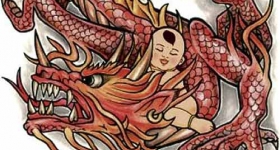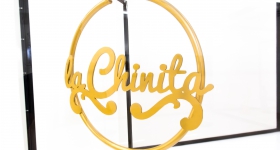When I was studying Mandarin in Taipei two and a half years ago, one of my classmates, another Taiwanese American, and I went to a dessert shop for bowls of douhua, or tofu pudding. I’d never had douhua before and diligently photographed my “exotic” treat before tucking in. “You’re not very Taiwanese, are you?” my classmate remarked.
I was taken aback, because I’d never thought that eating douhua was a pre-requisite for being “very Taiwanese.” I was raised in a relatively sugar-free household. We had shaved ice when it was hot and moon cakes during the Lunar New Year. Aside from that, most of my sweets came out of vending machines when my Mom wasn’t looking.
That was my excuse for never having experienced the wonder of douhua before -- but my classmate’s offhand joke still got under my skin.
The question of what being “authentically” Taiwanese means has always floated in the back of my brain, pushing its way to the front from time to time. As a teenager, the question came up whenever I wondered how close -- or not -- I wanted to be to the Taiwanese American community I grew up in. I didn’t fit what I understood to be the criteria for a good Taiwanese American girl: straight A’s in science and math honors courses, adept at two or more musical instruments, consistently respectful to parents and other elders, fluent in Mandarin, slender (I was a little chunky, another reason for the sugar limit in my house). I dropped out of Chinese school, even though I had a hard time communicating with many of my relatives, including my grandparents. If I was already so far from fitting in, I thought, why bother trying? Like other teenagers, I was crafting a sense of self -- and it seemed as if there was very little room for my Taiwanese heritage.
But then I left California to study at a small liberal arts college in New York. For the first time in my life, I was the only Taiwanese American person around. I missed home -- and part of home was its Taiwanese-ness, no matter hard to define that particular quality was, or how alienated it sometimes made me feel.
I moved to Taiwan hoping that living here would make me feel closer to my cultural heritage, but at first the disconnect only became more apparent. Aside from my lack of experience with douhua, I also didn’t know things like singer Teresa Teng’s Chinese name (the English-speaking world’s equivalent would be not knowing who John Lennon is) or that Taiwan has its own system of counting years (it’s currently 99). I didn’t know that when someone says good-bye to you by telling you to “walk slowly,” they mean “take it easy,” not “you’re walking too fast.” I couldn’t recognize pop megastars Jay Chou, Jolin Tsai or Wang Leehom (even though the latter had been my aunt’s student at Williams College). These were all things that surprised some people here, along with my limited language skills. How could someone who had parents born in Taiwan -- and who looked Taiwanese -- not know any of this or speak Mandarin with such a heavy accent?
Every time I discovered another gap in my knowledge (or had one pointed out to me), my culture shock deepened and the feelings of loneliness I’d felt as a teenager resurfaced. If belonging to a group means having a shared history and body of knowledge, then where did I fit in, here in Taiwan or back home with other Taiwanese Americans?
I’ve lived in Taipei for two and a half years now. My Mandarin has improved to the point where I am now almost as verbose in conversation as I am in English. Thanks to flipping through gossip and fashion magazines, I am fairly well versed in Taiwan’s celebrity culture, as well as popular slang (and some swear words). Because of my job, I’ve interviewed several of Taiwan’s top fashion designers and artists. I know random snippets of information like what the four most prestigious high schools in Taipei are and why Converse All-Stars were banned in the 1960s when Taiwan was under martial law. My Taiwan-born relatives tease me by saying, “you’re more Taiwanese than I am!”
What I’ve realized over the past couple of years, however, is that authenticity isn’t in the details. There’s no right way to be Taiwanese or Taiwanese American. When I looked for a sense of belonging, I was searching in the wrong places. One of the things I’ve realized while living in Taiwan and dealing with the identity issues it has brought up is that self-acceptance has to come from within. It sounds like a trite platitude, but accepting that helped me enjoy living here a lot more.
But even if depending on external criteria for a sense of belonging is merely an illusion, I’ll keep thinking about what it means to be authentic—and I’ll continue to wonder what I have to do to fit in. The search has been part of my life for so long that it has become like a worry stone, something to contemplate and meditate on without ever coming to a final resolution (but if it leads me to new desserts, all the better).
Catherine Shu is a US-born Taiwanese American currently living in Taipei and working as a features reporter for the Taipei Times. She blogs about her experiences in Taiwan at shu flies.









Comments